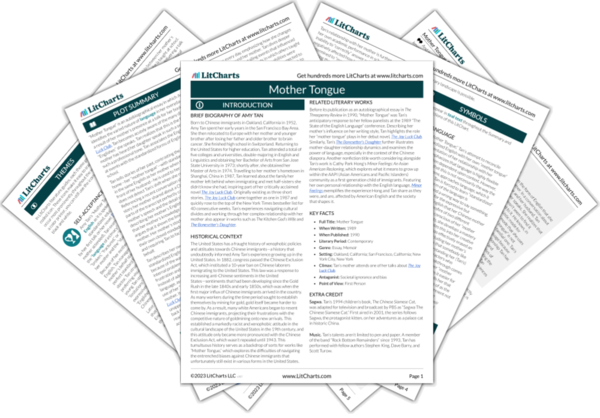Amy Tan’s “Mother Tongue” challenges the limits of language as she documents the struggles she and her mother have faced as Chinese-American English speakers. Combining direct quotations from her mother with her own expositional accounts of past events, Tan illustrates the multiple ways in which stories can be told, emphasizing a broader understanding of language by her mother than outsiders such as her stockbroker, doctor, and customer service workers give her credit for. This is most evident in Mrs. Tan’s account of Du Yusong, a Chinese political gangster out of Shanghai, who Mrs. Tan describes in great detail. Including his profession, relationship-status, and geographical origin within the city, Mrs. Tan’s story rivals the brief summary of Du Yusong that Tan herself includes in the essay.
However, Tan considers the apparent discrepancy between the vibrant, rich, and interesting stories her mother tells and the fact that such stories might not necessarily fit into the landscape of American literature. This, Tan suggests, is because American literature does not allow space for writing beyond the limits of standard English. While Mrs. Tan’s story is full of vivid detail that communicates an imaginable picture, the rhythm with which she speaks is transcribed into fragmented sentences that often omit particles and “proper” grammar styles characteristic of standard English. Tan’s own experiences writing beyond the confines of “standard English” illustrate both the difficulty of navigating the niche, homogenous literary world of American letters and the idea that a more inclusive literary landscape is possible.
Storytelling and Asian-American Voices ThemeTracker

Storytelling and Asian-American Voices Quotes in Mother Tongue
But to me, my mother’s English is perfectly clear, perfectly natural. It’s my mother tongue. Her language, as I hear it, is vivid, direct, full of observation and imagery. That was the language that helped shape the way I saw things, expressed things, made sense of the world.

Unlock explanations and citation info for this and every other Mother Tongue quote.
Plus so much more...
Get LitCharts A+It has always bothered me that I can think of no way to describe it other than “broken,” as if it were damaged and needed to be fixed, as if it lacked a certain wholeness and soundness. I’ve heard other terms used […] But they seem just as bad, as if everything is limited, including people’s perceptions of the limited-English speaker.
I believed that her English reflected the quality of what she had to say. That is, because she expressed them imperfectly, her thoughts were imperfect.
I wrote what I thought to be wittily crafted sentences, sentences that would finally prove I had mastery over the English language.
I began to write stories using all the Englishes I grew up with: the English I spoke to my mother, which for lack of a better term might be described as “simple”; the English she used with me, which for lack of a better term might be described as “broken”; my translation of her Chinese, which could certainly be described as “watered down”; and what I imagined to be her translation of her Chinese if she could speak in perfect English, her internal language, and for that I sought to preserve the essence, but neither an English nor a Chinese structure.
I wanted to capture what language ability tests could never reveal: her intent, her passion, her imagery, the rhythms of her speech and the nature of her thoughts.











